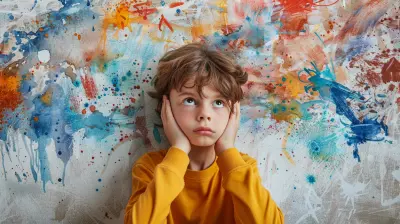How Psychotherapy Supports Personal Growth and Development
22 August 2025
Let’s face it, the phrase “personal growth and development” has been thrown around so much, it’s practically lost all meaning. It's like "organic" on a bag of gummy bears. But, believe it or not, there's one powerful, underrated tool that helps you become the best version of yourself — and no, it’s not a juice cleanse, a vision board, or 12 hours of motivational TED Talks. It’s psychotherapy.
Yeah, that thing people used to whisper about in elevators like it was a secret club. Spoiler alert: it's not just for people with “issues.” It’s for every human being who’s ever felt confused, overwhelmed, stuck, or like Michael Scott trying to declare bankruptcy by yelling, "I declare bankruptcy!" Spoiler #2: that doesn’t work in therapy either.
Buckle up, because we’re about to take a wild, sarcastic, and slightly-too-honest journey into how psychotherapy actually supports that glittery unicorn we call personal growth.
Wait, So What Exactly Is Psychotherapy?
Ah, yes. The million-dollar question. Let’s clear the fog.Psychotherapy – or as cool kids call it, therapy – is basically a playground for your mind and emotions, minus the swing set. It involves sitting down (literally or virtually) with a trained mental health professional who helps you unpack your thoughts, feelings, and behaviors. Think of them like a tour guide who doesn’t let you get lost in your own mental jungle.
Unlike your well-meaning friend Karen who insists “everything happens for a reason,” therapists are trained to help you dissect those reasons…without tossing in a Pinterest quote about resilience.
Personal Growth: More Than Just ‘Adulting’
We hear about personal growth like it’s a subscription box we can sign up for: “Personal Growth delivered monthly with bonus enlightenment and self-love.” Tempting, right?In reality, personal growth isn’t about becoming some flawless human who meditates daily and never yells in traffic. It’s about becoming more you – the you with clarity, resilience, self-awareness, emotional maturity, and maybe even a sense of humor about your own flaws. (Especially the one where you rewatch the same show 27 times instead of dealing with your feelings.)
Here’s where psychotherapy enters, stage left.
The Magic of Talking: Unpacking Emotional Suitcases
Ever try to haul an overstuffed suitcase through an airport? That’s your emotional life without therapy.Psychotherapy gives you the space to unpack everything you’ve been carrying in that mental Samsonite. Those half-forgotten childhood memories? The resentment from three jobs ago? The time your fifth-grade crush laughed at your haircut? Yeah. That stuff has more power than you think.
A therapist helps you take those emotions out, lay them on the metaphorical hotel bed, and figure out what to keep, what to toss, and what desperately needs to be laundered.
Self-Awareness: Because Knowing Thyself Beats Lying to Thyself
Therapy is like a mirror – but not the funhouse kind. It shows you who you really are, not who you pretend to be on LinkedIn.One of the biggest growth moments in therapy is when you realize, “Ohhh, I do that thing. That annoying thing I hate when others do.” Ouch. But also, yay! Because with awareness comes change. And with change comes growth, success, and fewer awkward confrontations with your reflection.
Breaking Patterns: Why You Keep Dating the Human Equivalent of a Red Flag
Here’s a classic plot twist: many of us keep repeating the same emotional mistakes without even realizing it. We’re like dogs chasing our own tails, wondering why our relationships, jobs, or eating habits go south every. single. time.Enter therapy – the plot twist you didn’t know your life needed. Your therapist starts pointing out those patterns faster than a Netflix algorithm recommending true crime documentaries. And the best part? Once you see the pattern, you can finally stop doom-scrolling through your own life.
Coping Skills That Don’t Involve Eating an Entire Pizza
Let’s be real – most of us have a coping strategy that looks suspiciously like Netflix and emotional snacking. And while there's nothing wrong with pizza (blessed be), it's probably not the best long-term strategy for handling stress, anxiety, or that weird existential dread that hits at 2 a.m.In therapy, you learn tools. Real, actual tools. Like how to identify your emotions (turns out “meh” isn’t one), how to set boundaries without feeling like a villain, and how to manage stress like a pro (or at least someone who doesn’t scream into a pillow daily).
Confidence: Now With Fewer Panic Attacks!
One of therapy’s secret powers? Confidence.No, it doesn’t turn you into Beyoncé overnight – but it does help you access your own version of fierce. As you start to understand yourself better, make healthier decisions, and stop burning out just to please others, something crazy happens. You start to like yourself.
Wild, right?
Growth isn’t about being perfect. It’s about being real and giving fewer hoots about what Becky from high school thinks of your career choices.
Emotional Intelligence: Because Feelings Aren’t Just for Poets
Emotional intelligence is basically the ability to identify, understand, and manage your emotions – and respond empathetically to others. It’s the secret sauce in relationships, communication, leadership, and not totally losing your cool when someone cuts in line.Therapy helps build this emotional muscle. You start to observe your reactions instead of being ruled by them. You go from "Why am I like this?" to “Oh, I know exactly why I’m like this – and here’s how I’m gonna deal with it.”
Healing Old Wounds: Cue the Tissues and Soul-Level Growth
Here’s the not-so-pretty side of growth: healing.You can’t keep slapping glitter on your trauma and calling it personality. Sooner or later, those past wounds — rejection, abandonment, betrayal, loss — come knocking, and therapy helps you answer the door with compassion instead of fear.
Healing doesn’t mean forgetting. It means understanding. Processing. Letting go (queue dramatic arm wave). And, yes, it’s sometimes messy and tear-filled. But it’s worth it when you realize your past no longer controls your present.
Boundaries: AKA How to Say “No” Without Imploding
Ah yes, boundaries – the ultimate adulting skill that no one teaches in school.Boundaries are the lines we draw between ourselves and the chaos of the outside world. They protect our time, energy, and sanity. And therapy? Therapy is the personal trainer that helps you build those boundary-setting muscles.
Whether it’s learning to say “no” without apologizing, or understanding that other people’s problems aren’t your job to fix, therapy supports your journey into becoming someone with a backbone and a heart.
Reconnecting With Purpose: You Are Not a Robot
Let’s get existential for a second.Many of us go through life on autopilot. Work, eat, sleep, doomscroll, repeat. It may feel safe, but it’s not fulfilling. Therapy invites you to hit the pause button and ask, “What actually matters to me?”
Turns out, when you ditch the noise, unlearn the social conditioning, and get back in touch with your core values, you might just find something wild – purpose. That magical thing that makes mornings suck less.
Embracing Change Without Having a Nervous Breakdown
Newsflash: growth involves change. And honestly, change can be terrifying. It’s like jumping off a metaphorical cliff and trusting there’s a trampoline at the bottom.Therapy helps you navigate change – whether it’s breaking up with toxic habits (or people), shifting careers, or just becoming emotionally fluent. It gives you tools to not only survive change but to actually thrive through it.
Because we’re not here to stay stuck. We’re here to evolve, awkwardly and beautifully.
Real Talk: Therapy Isn't a Magic Wand — It’s a Shovel
Let’s debunk a myth real quick.Therapy isn’t like waving a wand and poof! you’re healed, enlightened, and glowing with Zen-like vibes. It’s more like digging — messy, sweaty, emotional digging — into the layers of your beliefs, behaviors, and experiences.
But here’s the twist: beneath all that dirt, there are bloody gems. Strength, insight, freedom, and a true understanding of your own story. That’s the real glow-up.
So, Who’s Therapy Actually For?
Short answer: everyone with a brain and a heartbeat.Long answer: It’s for the people who want more from life than just existing. For the people tired of repeating cycles. For those ready to sit in discomfort long enough to find authenticity on the other side. For those brave (or desperate) enough to admit, “Hey, maybe I don’t have all the answers.”
Spoiler alert: None of us do. That’s the point.
Final Thoughts: Therapy is Self-Care with Depth
Forget bubble baths and $12 lattes labeled “self-care.” You want real self-care? Go to therapy.Psychotherapy supports personal growth and development in ways that are deep, raw, hilarious, painful, empowering — and oh-so-worth-it. It isn’t just about healing mental illness. It’s about becoming emotionally fluent, self-aware, relationally smart, and resilient as hell.
If you're ready to stop operating on emotional autopilot and start living a life that actually feels like yours, therapy might just be your ride-or-die.
Now go forth…and grow (responsibly, with a therapist).
all images in this post were generated using AI tools
Category:
PsychotherapyAuthor:

Matilda Whitley
Discussion
rate this article
1 comments
Luna Becker
Psychotherapy fosters personal growth by providing a safe space for self-exploration, enhancing emotional awareness, and developing coping strategies. Engaging in therapy can lead to profound insights and transformative life changes, promoting overall well-being.
August 29, 2025 at 4:10 PM

Matilda Whitley
Thank you for your insightful comment! I completely agree—psychotherapy is indeed a powerful tool for self-exploration and personal transformation.


